Victualling a Yacht. (A Guide to Provisioning a Yacht for short or long sea passages).
Part of the Colas regulations require us to make a passage plan prior to leaving port and this is covered previously in our Passage Plan writing section particularly relating to the Appraisal and Planning sections.
We want to explain a little more on the victualing or provisioning of a yacht, and crew experience and management, both of which are important and if not adequately taken into account will be likely to cause problems during, in particular, a longer voyage.
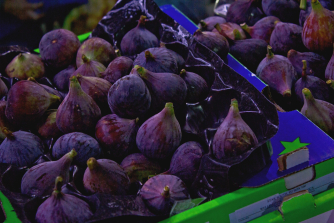
Figs - An interesting and tasty treat. Fresh figs can be frozen whole, sliced or peeled in a sealed container. Defrost prior to using and take care handling these delicate fruits.
Firstly, you might ask, “What is victualling and what is a victualling list?”. Quite simply, the dictionary definition is “to supply with or obtain victuals”. Helpful? Not really unless we know that the word ‘victuals’ (and also ‘vittles’) is an old fashioned word for food. Thus victualling really means “to supply with or obtain food”. In years gone by, the Navy used to have Victualling ships which supplied individual ships in the fleet with food and other stores prior to or during their voyages. Nowadays we have supermarkets and such like for most of our food and other associated items. Nevertheless the word has stayed with us particularly with reference to sailing and boats, and the importance of correctly and adequately victualling for our next passage is just as important now as ever. A victualling, or provisioning list is quite simply a list of food, drink and other stores requirements sufficient for the length of passage, to be obtained prior to leaving port. So, quite simply, provisioning a yacht has the same meaning as victualling a yacht, whether under sail or engine.
It really is a giant shopping list!!!
Following departure from a port means that, unlike a car journey, you can’t stop at a local convenience store for groceries, or at a diner for lunch, or a service station for fuel or other items. You are now on your own and if you haven’t taken it with you you are not going to get it whilst at sea!
It is really important for safety, morale and contentment that you, the skipper, has made provisions for the victualling requirements of those on board to be satisfied and happy. On a short passage, such items will relate to items such as the food and drink required for the day. However longer voyages, particularly those not including a port visit over a period of time, will require much more attention. If you have a crew and/or passengers with you on the the passage you will need to know if there are any particular dietary concerns which you need to take into account.
Check that vegetarians or vegans on board are catered for when choosing food items. The same goes for those on board who have a gluten intolerance. It is also essential not to forget that your cooking gas supply will be adequate for your needs throughout the passage and this item needs to be included in your pre-departure check list.
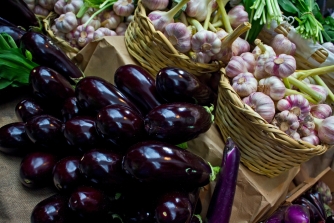
Grilled aubergines with garlic and herbs make a simple, very tasty nutritious meal which is easy to produce and suitable for vegetarians.
so that the kit can be replenished later.
It is also very important that an adequate First Aid Medical Kit is carried onboard which needs to be of an adequate size and content for the number of people on board. The main kit would be used generally for a more serious requirement/accident on board. We maintain a smaller kit as described in our victualling check list for the more normal/non urgent needs e.g. small cuts and grazes, headaches, tummy upsets, sea sickness requirements. Always be aware that your main first aid kit needs to be kept up to date and if any items are used during the voyage, a note needs to be made
Victualling is a serious and skilled business and thought must be given in relation to the length of voyage and nutrition requirements over what may be a long period. A satisfactory budget must be set aside for victualling and needs to be supervised by a person experienced in such matters, especially for a long voyage.
Victualling can generally be split into the following areas:
Basic items (B):
Fresh & tinned vegetables (V):
Meat - fresh, frozen and tinned (M):
Drinks and refreshments (R):
Snacks/sweets and deserts (S):
Dairy essentials (D): Food storage and packaging (P):
Staple and dry food items (T):
Fruit (F): Cereals and Breakfast items (C):
Health & Personal items (H):
Other items (O):
Not all yachts have a fridge or freezer on board and so care will need to be taken in the selection of victualling items with regard to shelf life outside of a fridge and perishable items will need to be chosen in regard to the safe onboard storage time. Larger yachts will
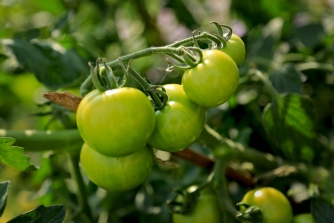
Salad stuff (lettuce, tomatoes, cucumber, celery, peppers etc) will not last for very long in storage, even refrigerated storage, and so needs to be planned to be consumed fairly early in the voyage otherwise it ends up as waste. Tomates can be purchased in a range of ripeness from green to red.
We have developed a check list for victualling supplies and also a Unique Victualling App which you will be able to download for your use at the end of this article.
most likely have decent sized food fridges and freezer. However on many production models these items are not always adequately taken into account and are often rather small and inadequate for a long voyage. Those yachts with a large fridge/freezer will clearly make it more

practical to choose items which can be safely stored for longer periods in the fridge. An adequate power supply needs to be guaranteed for them over the voyage period. Storing all non perishable goods needs to be carefully thought out and, depending upon the amount of food and other items stored, and each item needs to have its storage space recorded in writing so that you, and your crew and passengers are able to easily find the required items.
Basic items like eggs need to be stored carefully. Best stored in a refrigerator and generally will last between 3 to 5 weeks.
The storage of tins can be kept below decks (bilge area), provided they can be readily stored and retrieved. Bilges can, of course, get wet so it is good practice to mark the top of the tins with a marker pen as to what the tins contain!! If you are chartering a yacht, check that the food storage and preparation facilities will be adequate for your needs on the voyaye. Charter yachts do not always give such requirement due consideration, particularly with regard to cold storage and refrigeration/freezer facilities. Remember that you can freeze cooked rice, cheese and butter and fresh milk (remembering that it expands slightly, so alow for this by tipping a small amount out before freezing). Use ziplock bags where necessary for storing food to be frozen.
Lists, lists, lists ……….. !!!!
A passage of several days away from port will require meals to be adequately chosen in terms of times, and main meal times will need some thought as to an adequate menu for those on board. Dinner is generally the time when all those on board dine together and suitable meals need to be chosen including the victualling for them. A thoughtful choice for meals over a longer period, combined with all the crew dining together is a source of good morale and happiness for those on board. Other meal times such as breakfast and lunch may be more difficult to have together due to watchkeeping and other crew responsibilities over such periods.

Firm Kiwi Fruits ripen between a few days and a week at room temperature, longer if refrigerated. Once ripe, keep them well away from other fruits, even in a fridge. Once ripe, they will keep for one to two weeks. Use in deserts and fruit salads.
However it is to be recommended that all should dine together as often as practicable and if possible, at least once a day.
A very important consideration for victualling is the provision of snacks and drinks. These are invaluable, particularly for those crew members on watchkeeping duties and especially during those long night watches, and should be quick and easy to be on hand. Such practice also goes a long way to good crew morale and, for practical purposes, helps to keep the watch keepers from tiredness. They need to be easily accessible especially for those on night watchkeeping.
If the passage is of some length, say a matter of weeks and with several persons on board, the most practical and professional way of carrying out this important duty is to employ a competent and suitable experienced cook and to have him/her produce menus for all meals. Any cook with experience in these matters will be able to easily calculate the amount of meat generally to be consumed depending on the number of persons on board. The cook will be able to produce either a spreadsheet of meals relating to lunches and dinners, and from that will produce proposed daily menus from which may be derived the quantities of the separate ingredients and thus a list of the food and drink required. Add a provision for an overrun of the passage and provide for additional tinned food for such an eventuality.
Generally speaking it may reasonably be assumed that each person on board will consume in the region of 180 - 220 gm. of meat per main meal, so the cook will be able to calculate weights of meat required as a basis for the menus. Vegetables and other main foods may also be calculated and a good cook will know the quantities to purchase for each meal in relation to the days at sea and the number of persons on board.
Fluids consumption is very important and we reckon that an allowance should be made per person per day for a minimum of 2 to 2.5 litres of drinking water and more if voyaging in hot climates. This is a precious commodity and care and attention must be taken in the safe storage of such. Don't forgret that most people can get more hungry and thirsty at sea than on land.
The choice of fresh fruit needs to take into account various stages of ripeness if possible, otherwise the problem of the fruit becoming over ripe within a few days of leaving port and subsequently going off at the same time before being able to be eaten, will become a source of unnecessary waste. Think of bananas as being a typical example if they all became ripe at the same time. Purchasing different levels of ripeness will pay dividends with the crew if done correctly.
Selected fruit must be clean and dry prior to storage for it to remain fresh and not to go off early and contaminate other fruit nearby. Again the principle of choosing levels of unripe-ripe fruit is important depending on circumstances as detailed above. Use the same principle for purchasing green through red tomatoes and similar salad essentials.
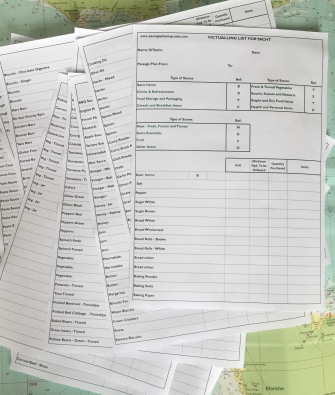
A typical victualling list for a yacht. This is our list which may be downloaded for free - see details at end of article.
Salad items (lettuce, tomatoes, cucumber, celery, peppers etc) will not last for very long in storage, even refrigerated storage, and so needs to be planned to be consumed fairly early in the voyage otherwise it ends up as waste. This sort of food as well as cabbage and root vegetables are best purchase close to departure, as will the purchase of fresh bread. A competent cook will possible be able to make fresh bread during a longer voyage and the ingredients will need to be supplied as part of the victualling process.
Depending where the initial victualling takes place, it is important that the choice of supermarket or wholesale provider is made so that if possible the victualling list can be fulfilled and delivered, by the supermarket to the point of loading. This will save time and make it far easier for loading and storing in the correct order of use - another good reason for
having a proper schedule of menus. It is also to be recommended that the meat be pre-frozen prior to leaving the supermarket and many suppliers are able to provide this service and are able to freeze items much quicker and colder that onboard freezing. Needless to say the facilities on board need to be adequate to keep adequate volumes of frozen meat and other such items to be kept in a frozen state until required. We must also assume that long voyages with several persons on board will have suitable cooking/galley equipment on board. The cook may be able to make and freeze some of the earlier main meals, thus relieving pressure on the galley over the first few sailing days.
Obviously on a smaller boat this may not be possible or practical, and the needs to keep food fresh and edible are required to be balanced against the number of persons on board, and the number of days at sea. If an adequate power supply is available on board, the addition of a electric soup maker may be useful for using up vegetable and other suitable foods which are coming to their 'use by' date, thus reducing unnecessary food waste.
On a boat with just a few people on board, unless you have a super (and willing) cook on board, we would recommend that main meals should be simple, but nutritious, and perhaps highly spiced ingredients and strong curries should be avoided. Those involved in the preparation of meals should be excused washing up duties, and be aware that more simple meals generally mean less washing up!! If you have crew members on board who are averse to cooking, give them assignments to prepare the easier meals like breakfast and lunch.
Needless to say there needs to be an adequate amount of cooking equipment and utensils including crockery and cutlery for the planned meals and for the number of people on board.
There are many useful sites on the internet which give good advice regarding on-board meals for both short and longer voyages, and we would recommend they be researched and the ingredients for your choices checked and included in your victualling list. Remember that the more perishable food items like oranges, pears, apricots and bananas need to be eaten early in the voyage. Apples and harder fruits last longer and may be able to be stored in a dry and out of the way (but accessible) area.
Outside of general meals there may be a requirement for bread making to be carried out depending upon the voyage length and persons on board. It may be impractical to cary a lot of bread due to storage and perishable constraints. It may be practical to include the necessary ingredients and preparation knowledge for bread making as discussed above. However this is unlikely to be a requirement unless called for by an extended voyage over a period of weeks.
As discussed above, do not treat victualling lightly. It is a very important skilled and serious requirement particularly on longer voyages and with a crew on board. If you are not the person who will be doing the general cooking on board it is essential that you consult and agree what is required with those who will be the main cook(s). Having a pre-prepared menu of proposed main meals throughout the voyage is required. As said before, it is a very important part of crew morale and don’t forget that a hungry and thirsty crew is an unhappy one. As a skipper we think that you would want to avoid such an event!
Yacht provisioning services - Not just for Superyachts!
We have described above the basics of how many of us prepare for a voyage in terms of victualling or provisioning. If starting from our home port, particularly in the UK, we are blessed with many nearby supermarkets where it is easy to obtain our provisioning requirements. However starting our sailing, whether by chartered yacht or joining a flotilla from a port or marina in a different country, raises more difficult oportuinities to provision our boat. We discuss this in greater detail in a separate article which may be read by clicking HERE.
Aim for the Stars!
One of our most ambitious and favourite destinations. Vineyard Haven, Martha's Vineyard, Massachusetts, USA. An Atlantic crossing requires detailed thougt and provisioning. Not for the faint hearted!

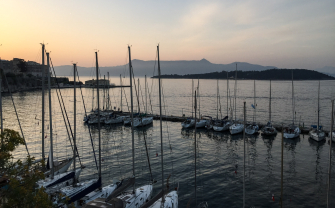
Good Hygene
Of huge importance to all on board, is hygiene and cleanliness, particularly with respect to all food preparation and storage of fresh food and all meat products. Any and all food preparation must start with the preparer having washed their hands thoroughly. Do not allow perishable food to be left out for longer than absolutely necessary. Washing up should be carried out
A safe arrival in Nautical Club N.A.O.K marina in Corfu, Greece following a fabulous 21 day cruise from Plymouth, Devon, England with one stop in port at Gibraltar for rest and relaxation, further Victualling and refuelling.
immediately following meal times. All those on board need to be aware of good hygiene practices and it must be made clear that
following the use of toilets/heads, hand washing and drying must be carried out in the toilet area and not in the galley area. Depending upon level of use, tea towels should be changed at least on a daily basis and must not be used for hand drying. Hand towels must be made available in galley and toilet areas and be changed on a regular basis as part of the crew duties. All work surfaces including surfaces used for dining must be kept scrupulously clean with antibacterial sprays/cloths, as must door handles and companion way hand holds. Warmer weather and hotter climates can lead to an acceleration of illness due to poor hygiene practices and all the crew need to be made aware of, and practice good hygiene habits. Saloon, dining areas and floor cleaning should be on a daily basis and must be part of the daily crew duties to be shared throughout. Galley sinks/bowls and the heads wash hand basins need to be included in this regime. Illness caused by bad hygiene on a yacht during a long passage, and particularly in hot climates, can pass through the crew like wildfire, and the skipper needs to be very aware of this.
Waste food & other waste
Bear in mind that it is ‘verboten’ to throw waste food and used containers/packaging overboard. This includes apple cores, orange peelings, potato peelings indeed anything in connection with food preparation and food waste outside of small edible waste food items. All waste of this nature is required to be bagged up safely and stored in a suitable area obviously away from living accommodation. Think of being home and practicing separation of tins and plastic food containers. Wash out tins and plastic bottles and crush/reduce in size where possible prior to double bagging in suitable large waste bags. Outside of washing up water there will be very little which comes under allowed discharge to sea. No self respecting skipper would allow this rule to be broken and all persons on board must be made aware of good and correct waste disposal practice.
A Policy regarding the consumption of alcohol on board
The on-board alcohol policy is entirely the decision of the yacht skipper and needs to be balanced against the current laws regarding vessels at sea and alcohol consumption and indeed, the policy of the RYA is to limit such use and urges all boaters not to mix alcohol and boating.
Our view is that anywhere outside of a port and during a sea passage, the consumption of alcohol is forbidden to all those on board whether they be crew or passenger. The risk of misuse of alcohol and safety at sea cannot be stressed too much. Professional crew should totally refrain from consuming alcohol whilst in charge of a vessel, whether at sea or in port. In port there may be a relaxation of this rule but only for those not on any form of duty and be aware that it is illegal for any crew on Watchkeeping duty to consume alcohol.
It really is for the skipper to decide whether or not to allow the use of alcohol on board.
_________________________________
We have developed a check list for victualling supplies which you may download for your personal use. It is also included in the ‘Free Downloads’ (Opens in new tab) page of this site. (Please note that the list is under constant development and may be downloaded at any time).
Download Free Yacht Victualling List
We have also developed a unique Victualling List App. Written as an Excel Application it is far more than a provisioning spreadsheet which may be purchasd as an Excel download. To read more about this unique App. please follow the link as below.


